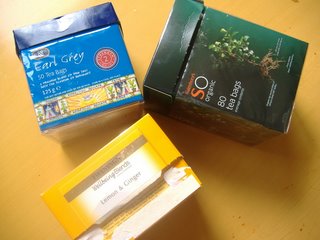
There will always be Grange. DRC. The hard-hitters down Napa-way. These wines, and countless others in the super-premium market, will always have a name, a face, good years with the bad -- an element apparent when price tags are slapped on bottles.
And there will always be Vin de Table, that daily drinkable that ends up every night on dinner tables across the world. It is those wines, those average-joe offerings wine producers present to us that this column is devoted to. Think typically £5 to £10 per bottle.
Critics fill novels with information on how to best spend your tenner. Books which spend more time gracing the grimy surfaces of coffee tables and the rarely dusted Ikea 'Bonde' book cases, than in the hands of serious daily wine drinkers.
These are wines, granted, that are rarely noteworthy. In fact, all the wines sampled this week had not a single word written, until this moment. Summed up here, the Marks and Sparks white Burgundy 2004 and San Tommasi 'Giani' Sicilian white, both served at a friend's finally-off-of-probation celebration. Both were good bargains, excellent and crisp. Both were served cold and felt proper, and tasted too similar, coming not only from different countries, different climates and different soils.
Also, three nights were devoted to Bonterra Organic 2004 Shiraz Carignan Sangiovese. All three bottles were great, with or without food, fresh and clean. But, a greater point was that two bottles tasted exactly the same, but the third, same year and perhaps shipped on the same crate, tasted distinctly different. For whatever reason, this one tasted a bit rusty, with a slight hint of earth. This later lulled and flavours further diminished. I love it. Micheal Laroche once complained that he opened a case of one of his wines and found twelve different tastes.
Laroche may feel frustrated by inconsistent flavours, but I call it character.
Now, about the show, several prospects are up in the air this week. I will wait until 'it' happens, or likely doesn't happen, before filling you in.
Instead, an anecdote. The Times Foodie-at-large, Tony Turnbull, devoted his weekly column to the hard-working Tea tasters at Twinnings brew HQ. According to Turnbull, the team taste 700 blends a week, taken from up to 27,000 different tins, in order to achieve a consistent flavour year in and year out.
Head tongue, Jeremy Sturges, explained that tea leaves are an agricultural product, with flavours varying greatly, even from plantation to plantation, depending on weather, harvest time, whatever. (Beginning to sound familiar?)
Their job is to sip and spit until they come up with a formula to get that morning nip of English Breakfast tasting the same, literally for your entire life, regardless of what went down on the farm. This is true, and even though each tea has a character, an identity, a fact Twinnings could care less about, presumably each tea ultimately ends up entirely drinkable.
However, I doubt Sturges has spent any nights with someone holding back his hair, while he spews up his guts after a heavy night of binge drinking a bad batch of Lapsang Souchong. 27,000 tins, each one different, yet forced together in a factory, in order to taste the same. (Said hyperbole and non sequitur is intended to vindicate Twinings and its employees from any wrongdoing and, thusly, nullifies any future-filed libel lawsuits.)
Also,Turnbull admits he "never realised tea-making was so complicated." Insert a volcano like rage into my skull now. But, not that it's our JOBS to know everything beverage-related. Equally shameful, years ago, I selected the tea service for Le Pavillion hotel in New Orleans. Back then, I could pick you as a Darjeeling freak or an Assam junkie by the moment you sat down and begged for scones. But I still, likewise, had no idea.
Good tea-making, as Turnbull now realises, is so complicated because it aims to destroy the very essence of Tea. Ironic. Tragic.
The same is happening to wine.
Presumably, tea merchants from years back – Turnbull's text marks 300 years for Twinings -- would offer the different types of teas available, depending on available sources. Today, the concept of selling vintage teas to me is as exciting as it is unlikely to ever happen again. Imagine stepping into a tea merchant, the bell on the door chiming your entrance, and as the dear old tradesman in the back shuffles to take your order, your senses are overwhelmed with the finest brews from China and India. "Care to try the 2006 Lady Grey, sir? Just in, blended with the finest biodynamic oranges handpicked by a thousand shoeless orphans?" Not going to happen.
Ditto for vino. At least at the cheaper end. Big producers are consolidating, marketing, moving quickly, in order to create consistent wines year in and year out. It's is a solid corporate business model, as we see with Twinings.
Prepare. Wine shops with two categories are coming: old world and new world. The former being, if we are luckily, separated by country, the latter, by grape -- as it pretty much is already. All other opinions don't really matter, and probably, have even less merit.
Think about it. I have, and that is why, this week, I don't find this column amusing. Not even one bit.
1 comment:
Once I was at the International Farmers Market in Atlanta and I ran across some yerba mate. I knew that Che Guevara liked the stuff so I bought it.
It tasted like liquified cigarette ashes and I did not feel any more revolutionary after my first cup. I got gyped!
Post a Comment